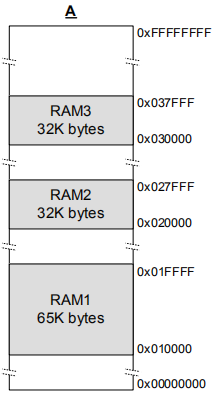转载自https://blog.csdn.net/zhoutaopower/article/details/106748308
FreeRTOS 中的 heap 5 内存管理,相对于 heap 4《FreeRTOS --(5)内存管理 heap4》 只增加了对非连续内存区域的管理,什么叫非连续区域内存呢?比如一款芯片,它即支持了内部的 RAM,也支持了外挂 RAM,那么这两个内存就可能在地址上不是连续的,比如 RAM1、RAM2、RAM3,如下所示:

针对这种情况,就可以使用 heap 5 来管理;
不同于之前的 heap 管理,heap 5 引入了一个结构体来管理这些非连续的区域:
typedef struct HeapRegion { /* The start address of a block of memory that will be part of the heap.*/ uint8_t *pucStartAddress; /* The size of the block of memory in bytes. */ size_t xSizeInBytes; } HeapRegion_t;
一个块连续的内存用一个 HeapRegion_t 表示,多个连续内存通过 HeapRegion_t 数组的形式组织成为了所有的内存;
heap 5 要求,在调用正式的内存分配函数之前,需要定义 HeapRegion,并调用 vPortDefineHeapRegions 来初始化它;
官方给了一个 demo:
/* Define the start address and size of the three RAM regions. */ #define RAM1_START_ADDRESS ( ( uint8_t * ) 0x00010000 ) #define RAM1_SIZE ( 65 * 1024 ) #define RAM2_START_ADDRESS ( ( uint8_t * ) 0x00020000 ) #define RAM2_SIZE ( 32 * 1024 ) #define RAM3_START_ADDRESS ( ( uint8_t * ) 0x00030000 ) #define RAM3_SIZE ( 32 * 1024 ) /* Create an array of HeapRegion_t definitions, with an index for each of the three RAM regions, and terminating the array with a NULL address. The HeapRegion_t structures must appear in start address order, with the structure that contains the lowest start address appearing first. */ const HeapRegion_t xHeapRegions[] = { { RAM1_START_ADDRESS, RAM1_SIZE }, { RAM2_START_ADDRESS, RAM2_SIZE }, { RAM3_START_ADDRESS, RAM3_SIZE }, { NULL, 0 } /* Marks the end of the array. */ }; int main( void ) { /* Initialize heap_5. */ vPortDefineHeapRegions( xHeapRegions ); /* Add application code here. */ }
如果有 3 个 RAM 区域的话,那么这样去定义他们;
需要注意的几点是:
1、定义 HeapRegion_t 数组的时候,最后一定要定义成为 NULL 和 0,这样接口才知道这是终点;
2、被定义的 RAM 区域,都会去参与内存管理;
那么问题就来了,在真实使用的时候,有可能你很难去定义部分 RAM 的 Start Address!
比如,一款芯片,它告诉你,它的第一块 RAM 有 64KB,第二块 RAM 有 32KB,第三块 RAM 有 32KB,那么你显然不能够直接将这些内存信息,按照上面 demo 代码的形式,定义到这个表格中,因为在编译阶段,有可能你相关的代码和数据等等(.text,.data,.bss,等)都会占用一部分的 RAM,但凡是定义到这个 HeapRegion_t 数组表格的,都会参与内存管理的行为,这显然是我们不愿意的;
也就是说,比如你芯片的 RAM 起始地址 0x2000_0000,你编译你的 Source Code 后,相关的代码和数据要占用 20KB,也就是 0x5000;那么你定义的 RAM1_START_ADDRESS 起始地址,就必须要大于 0x2000_0000+0x5000,这样才不会踩到你的其他数据;但是呢?你总不可能每次编译完都去改你的这个表吧?这是很痛苦的事情;
所有考虑到实际的使用,官方给出参考 demo 的方法是:
/* Define the start address and size of the two RAM regions not used by the linker. */ #define RAM2_START_ADDRESS ( ( uint8_t * ) 0x00020000 ) #define RAM2_SIZE ( 32 * 1024 ) #define RAM3_START_ADDRESS ( ( uint8_t * ) 0x00030000 ) #define RAM3_SIZE ( 32 * 1024 ) /* Declare an array that will be part of the heap used by heap_5. The array will be placed in RAM1 by the linker. */ #define RAM1_HEAP_SIZE ( 30 * 1024 ) static uint8_t ucHeap[ RAM1_HEAP_SIZE ]; /* Create an array of HeapRegion_t definitions. Whereas in Listing 6 the first entry described all of RAM1, so heap_5 will have used all of RAM1, this time the first entry only describes the ucHeap array, so heap_5 will only use the part of RAM1 that contains the ucHeap array. The HeapRegion_t structures must still appear in start address order, with the structure that contains the lowest start address appearing first. */ const HeapRegion_t xHeapRegions[] = { { ucHeap, RAM1_HEAP_SIZE }, { RAM2_START_ADDRESS, RAM2_SIZE }, { RAM3_START_ADDRESS, RAM3_SIZE }, { NULL, 0 } /* Marks the end of the array. */ };
即,将链接的代码数据,根据链接器(Linker)配置后,这些都放置在第一段的区域,ucHeap 也放在一样的地方,这样就避免去根据 map 文件去硬编码这个表格;
通过 beyond compare 可以知道,heap 5 和 heap 4 的代码在分配内存的 pvPortMalloc,和释放内存的 vPortFree,以及插入节点合并空闲内存 prvInsertBlockIntoFreeList 的部分,几乎完全一样,唯一不一样的地方在于:
heap 4 的内存初始化用的是 prvHeapInit
heap 5 的内存初始化用的是 vPortDefineHeapRegions
那我们就来看看这个 vPortDefineHeapRegions 的实现:
void vPortDefineHeapRegions( const HeapRegion_t * const pxHeapRegions ) { BlockLink_t *pxFirstFreeBlockInRegion = NULL, *pxPreviousFreeBlock; size_t xAlignedHeap; size_t xTotalRegionSize, xTotalHeapSize = 0; BaseType_t xDefinedRegions = 0; size_t xAddress; const HeapRegion_t *pxHeapRegion; /* Can only call once! */ configASSERT( pxEnd == NULL ); pxHeapRegion = &( pxHeapRegions[ xDefinedRegions ] ); while( pxHeapRegion->xSizeInBytes > 0 ) { xTotalRegionSize = pxHeapRegion->xSizeInBytes; /* Ensure the heap region starts on a correctly aligned boundary. */ xAddress = ( size_t ) pxHeapRegion->pucStartAddress; if( ( xAddress & portBYTE_ALIGNMENT_MASK ) != 0 ) { xAddress += ( portBYTE_ALIGNMENT - 1 ); xAddress &= ~portBYTE_ALIGNMENT_MASK; /* Adjust the size for the bytes lost to alignment. */ xTotalRegionSize -= xAddress - ( size_t ) pxHeapRegion->pucStartAddress; } xAlignedHeap = xAddress; /* Set xStart if it has not already been set. */ if( xDefinedRegions == 0 ) { /* xStart is used to hold a pointer to the first item in the list of free blocks. The void cast is used to prevent compiler warnings. */ xStart.pxNextFreeBlock = ( BlockLink_t * ) xAlignedHeap; xStart.xBlockSize = ( size_t ) 0; } else { /* Should only get here if one region has already been added to the heap. */ configASSERT( pxEnd != NULL ); /* Check blocks are passed in with increasing start addresses. */ configASSERT( xAddress > ( size_t ) pxEnd ); } /* Remember the location of the end marker in the previous region, if any. */ pxPreviousFreeBlock = pxEnd; /* pxEnd is used to mark the end of the list of free blocks and is inserted at the end of the region space. */ xAddress = xAlignedHeap + xTotalRegionSize; xAddress -= xHeapStructSize; xAddress &= ~portBYTE_ALIGNMENT_MASK; pxEnd = ( BlockLink_t * ) xAddress; pxEnd->xBlockSize = 0; pxEnd->pxNextFreeBlock = NULL; /* To start with there is a single free block in this region that is sized to take up the entire heap region minus the space taken by the free block structure. */ pxFirstFreeBlockInRegion = ( BlockLink_t * ) xAlignedHeap; pxFirstFreeBlockInRegion->xBlockSize = xAddress - ( size_t ) pxFirstFreeBlockInRegion; pxFirstFreeBlockInRegion->pxNextFreeBlock = pxEnd; /* If this is not the first region that makes up the entire heap space then link the previous region to this region. */ if( pxPreviousFreeBlock != NULL ) { pxPreviousFreeBlock->pxNextFreeBlock = pxFirstFreeBlockInRegion; } xTotalHeapSize += pxFirstFreeBlockInRegion->xBlockSize; /* Move onto the next HeapRegion_t structure. */ xDefinedRegions++; pxHeapRegion = &( pxHeapRegions[ xDefinedRegions ] ); } xMinimumEverFreeBytesRemaining = xTotalHeapSize; xFreeBytesRemaining = xTotalHeapSize; /* Check something was actually defined before it is accessed. */ configASSERT( xTotalHeapSize ); /* Work out the position of the top bit in a size_t variable. */ xBlockAllocatedBit = ( ( size_t ) 1 ) << ( ( sizeof( size_t ) * heapBITS_PER_BYTE ) - 1 ); }
经过一些对齐操作,将 demo 中的 3 块内存通过链表的方式挂接起来了,只不过内存地址不连续而已,但是对于连续的内存地址中,照样在释放的时候,可以进行合并操作;
